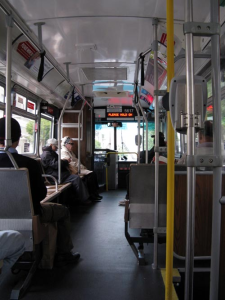In Part 1 of this two-part series I shared tips on what to do before and upon boarding and exiting public transportation. Now here’s what to do after boarding… Oh, if you missed Part 1, here’s the link (Also at https://www.advancedetiquette.com/2015/04/8-etiquette-tips-for-public-transportation-part-1/)
1. Give others your seat: Younger men and women should always offer their seat to elderly or disabled passengers. In fact, what’s wrong with giving up your seat to anyone in need? You could do so for a pregnant woman, a mom with an infant or toddler, or someone struggling with a large load of bags. When sitting in the reserved seating areas, always give up your seat to others who may need a seat more than you. One day you may want the same courtesy.
2. Keep germs contained. Cover your mouth with a piece of tissue or the sleeve of your garment held across your elbow when you sneeze or cough. There’s nothing worse than seeing someone sneeze into their hands and having to touch the same pole or strap.
3. No noise, please: Every passenger deserves peace and quiet. Keep your speaking voice low, and do not sing or hum aloud, especially when using headphones when listening to music or a video on your electronic device. When others can hear what you are saying or listening to, you or your device are too loud. When talking on your cell phone, keep the conversation brief and speak in as quiet a voice as possible. You may have to ask the other party to turn up the volume on his or her phone, so you won’t have to speak even louder.
4. Don’t eat or drink. On most public transportation, eating and drinking is prohibited. Check to see if there are signs regarding consumption. When allowed, however, the key is to not to eat foods with bold smells or those that are messy to eat, such as BBQ ribs. Never leave wrappers and finished containers on a seat or tossed on the floor. What you brought on you must take out to dispose of in marked receptacles outside the bus.
5. Backpacks and large parcels. Move slowly and with caution and care when wearing a backpack, shoulder bag, or carrying items of any kind, no matter the size. These items add girth to your body size. Never move without first considering the space you need in front and back of you to avoid bumping into others. Always be sensitive and considerate by asking or saying “excuse me” or when navigating through a crowd.
6. Keep your belongings safe. Thieves love passengers with open backpacks, purses, and bags on in a crowded bus where they can easily reach in and steal things. Always remove your shoulder bag and backpack and place them on your lap or as appropriate, on the floor in front of you. With your bag is in front of you, it not only protects the bag from thieves, it also helps you to move around without pumping into other people. Avoid placing personal belongings on the seat next to you, especially the aisle seat.
7. Be polite and respectful at all times. Make every effort to have a pleasant and positive experience. In the San Francisco Bay area—where I live—most passengers greet drivers with a “Good morning” or “Hello” upon entering. Upon exiting, we say a cordial “Thank you.” I find this most enjoyable to do and to see in others. All drivers like to be appreciated and it truly makes the rides more pleasant.
8. Never confront or argue with rude people. Your safety is of primary concern, so be careful how you respond to someone who confronts you. Don’t allow situations to escalate by returning any harsh words. Such behavior never resolves anything. Instead, stop talking and walk away, to allow the situation to cool off. Remember that you most likely won’t ever see the person again, so there is little point in confronting the person and making the situation worse, which then becomes a lasting “negative” memory.
In conclusion, do your part to make a ride on public transportation the most positive experience possible. Display respect, courtesy, and good manners, even when others don’t and you are tempted to mirror back exactly what they say and do to you.
Question: What other etiquette tips do you have for public transportation users? What are you biggest gripes? When sharing, be sure to include an antidote or remedy to the situation as a learning component.
Happy Practicing!


Thanks for this post, I am going to use this as a discussion item in my class. I would like to add to #8 — Get Up and Move to another seat. Sometimes it is best to move to another seat when a stranger is speaking inappropriately sexual, political, or disrespectfully to you.
I enjoy your column every month.
A subscriber sent the following via email to post with permission:
Syndi:
Good tip! My husband could go on and on about all the things people do on BART trains. Sometimes he speaks up, which you have not addressed, such as when someone is talking too loud on the phone, or clipping their nails in front of him.
Re the former, one time he started responding out loud to what the person was saying. When the man noticed, he said, “This is a private conversation!” to which my husband retorted, “Not anymore.”
Sometimes when I can’t stand watching something I will change seats. Ex. people making out.
You might consider a third column about what to do when people do gross things, or beg for money, or annoy the heck out of you. People might appreciate that.
DJ